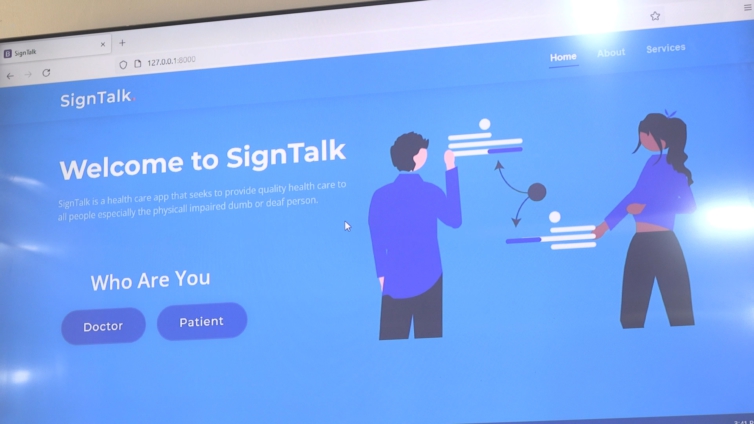Most hospitals in Ghana do not have support for hearing-impaired and speech-impaired people.
In most cases, there are no sign language translators on stand-by to aid the hearing-impaired and speech-impaired patients in accessing healthcare.
This has prevented many from visiting health facilities because they cannot effectively communicate their ailments to doctors, and health professionals also cannot communicate their expert directions to them.
Stigmatization of the hearing and speech-impaired community in Ghana has led to their isolation.
A significant contributor to this is the communication gap between them and society.
These people communicate in sign language, while the rest of us in society communicate with speech.
Because of this isolation, most people do not feel the need to learn sign language because, more likely than not, they do not know anyone who is hearing-impaired or speech-impaired.
To resolve this challenge, some students at KNUST have developed an app called SignTalk to help the hearing and speech-impaired access healthcare.
SignTalk seeks to solve this problem by being a first-step initiative to bring the hearing and speech-impaired community back into society by bridging the deeply-rooted communication gap.
According to the developers, Dankwah Kwabena Darko Manu and Nana Agyemang Duah. the app does this by providing features that allow speech-to-sign-language translation and sign-language-to-speech translation.
For the speech-to-sign-language translation, SignTalk allows a doctor to speak into their device’s microphone and translate the speech into Sign language by showing the hearing-impaired and speech-impaired patient videos of sign language that represent exactly what the doctor said.
For the sign-language-to-speech translation, SignTalk achieves it by leveraging the power of computer vision and deep learning.
SignTalk allows the hearing and speech-impaired to perform sign language in front of their device’s camera and subsequently translate the sign language into speech played audibly by the doctor.
By doing this, SignTalk effectively acts as a communication facilitator and translator between the hearing-impaired or speech-impaired patient and their doctor.
This, in effect, will restore the confidence in the speech-impaired and hearing-impaired community to access health care since they can effectively communicate their ailments and receive medical directions from their doctors conveniently.
To learn more about the App and join the waitlist for its release, partners, stakeholders, or investors can visit https://csapps.knust.edu.gh.
Latest Stories
-
We’ll cut down imports and boost consumption of local rice and other products – Mahama
2 hours -
Prof Opoku-Agyemang donates to Tamale orphanage to mark her birthday
3 hours -
Don’t call re-painted old schools brand new infrastructure – Prof Opoku-Agyemang tells gov’t
4 hours -
Sunon Asogli plant will be back on stream in a few weeks – ECG
4 hours -
ECOWAS deploys observers for Dec. 7 election
4 hours -
73 officers commissioned into Ghana Armed Forces
4 hours -
Impending shutdown of three power plants won’t happen – ECG MD
4 hours -
Ghana shouldn’t have experienced any ‘dumsor’ after 2017 – IES Boss
5 hours -
Lamens flouted some food safety laws in re-bagging rice – Former FDA Boss Alhaji Hudu Mogtari
6 hours -
Afcon exit: Our issue is administrative failure and mismanagement, not lack of talent – Saddick Adams
6 hours -
WAPCo to commence major pipeline maintenance and inspection from November 25
6 hours -
CEO of Oro Oil Ghana Limited Maxwell Commey listed among the 100 Most Influential People Awards, 2024
6 hours -
Power crisis: Amandi is off due to maintenance, not debt – ECG Boss
7 hours -
Votes cast for late Akua Donkor to be declared invalid – Electoral Commission
7 hours -
You can’t keep “incompetent” Otto Addo for the long term – Countryman Songo
7 hours

